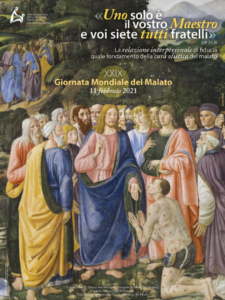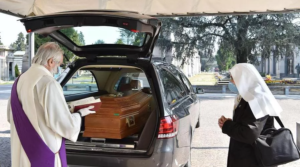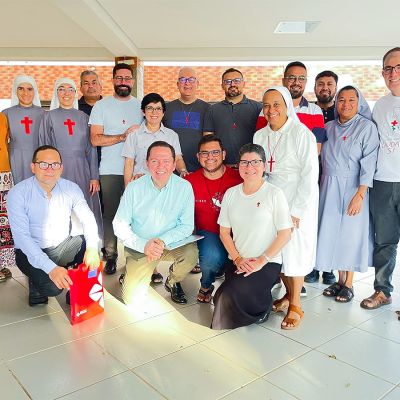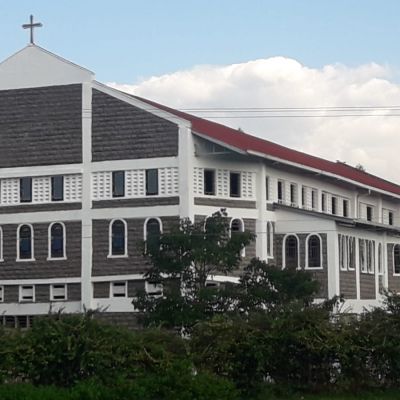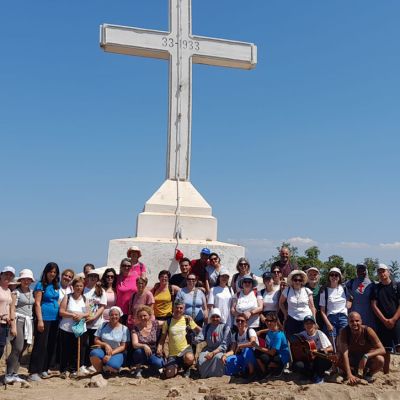NEWSLETTER 73 // GENNAIO 2021
Message of the Holy Father Francis for the 29th World Day of the Sick [11 February 2021]
“You have but one teacher and you are all brothers” (Mt 23:8). A trust-based relationship to guide care for the sick
The celebration of the XXIX World Day of the Sick on 11 February 2021, the liturgical memorial of the Blessed Virgin Mary of Lourdes, is an opportunity to devote special attention to the sick and to those who provide them with assistance and care both in healthcare institutions and within families and communities. We think in particular of those who have suffered, and continue to suffer, the effects of the worldwide coronavirus pandemic. To all, and especially to the poor and the marginalized, I express my spiritual closeness and assure them of the Church’s loving concern.
1. The theme of this Day is drawn from the Gospel passage in which Jesus criticizes the hypocrisy of those who fail to practise what they preach (cf. Mt 23:1-12). When our faith is reduced to empty words, unconcerned with the lives and needs of others, the creed we profess proves inconsistent with the life we lead. The danger is real. That is why Jesus uses strong language about the peril of falling into self-idolatry. He tells us: “You have but one teacher and you are all brothers” (v. 8).
Jesus’ criticism of those who “preach but do not practise” (v. 3) is helpful always and everywhere, since none of us is immune to the grave evil of hypocrisy, which prevents us from flourishing as children of the one Father, called to live universal fraternity.
Before the needs of our brothers and sisters, Jesus asks us to respond in a way completely contrary to such hypocrisy. He asks us to stop and listen, to establish a direct and personal relationship with others, to feel empathy and compassion, and to let their suffering become our own as we seek to serve them (cf. Lk 10:30-35). READ MORE
Scarica qui i materiali per l’animazione della prossima Giornata Mondiale del Malato
Manifesto
Locandina
Cartolina
Scheda Pastorale
Scheda Liturgica
Scheda animazione parrocchiale
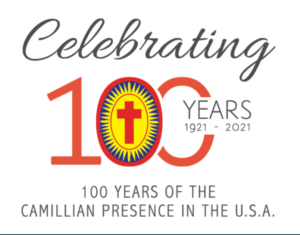


Mueller and his fellow Germans maintained a strong presence in the Camillians well into the 1960s, but American men would need to join if the community was going to prosper. A novitiate was built in 1935 and a House of Studies in 1942 in order to encourage Americans to join. That effort largely succeeded until the 1980s when many religious communities found it difficult to attract vocations. Still the order had sufficient numbers to see multiple expansions of their facility in Wauwatosa and, with the addition of some Italian priests, the opening of St. Camillus Hospital in Whitinsville, Massachusetts in 1964.
As time passed the community became a healthy mix of men from around the world. Today the USA Camillians include members from: Brazil, Italy, Nigeria, India, Viet Nam, Philippines and the United States. While the nationalities of the Camillians have changed over the years, but the commitment of all of these men has remained the same. That is, to provide compassionate and loving care to all people. Throughout this centennial year monthly columns will be published that look at the Camillians and their impact on the areas they have served.
The 100th anniversary of the Camillian Delegation of the United States of America – Photogallery
THE DELEGATION IN COLOMBIA-ECUADOR
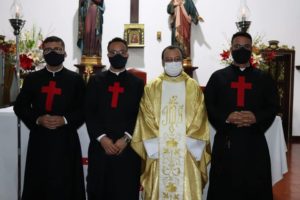


THE DELEGATION IN UGANDA
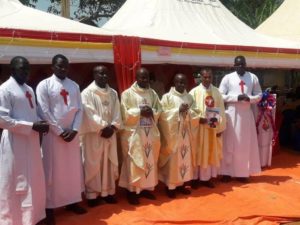


‘SALUTE & SVILUPPO” – prospettive per il futuro
Let’s help our missions
The history of Camillian missions is almost a secular history. In the 17th century, the first century of the Order’s life, Camillian religious were engaged in Italy, where there were lots of dramatic situations with the repeated epidemics and pestilences, during which the Camillians gave witness to heroic charity. One of these was the famous plague in Milan in 1630, in which more than 25 Camillian religious died as “martyrs of charity.” Besides, Camillians were called upon to bring aid to the wounded in the numerous bloody wars that raged throughout Europe (for example, the Hungarian campaign in 1595, the Thirty Years’ War in 1627, in Spain and Portugal). It is not without reason that Camillians have been recognized as the precursors of the International Red Cross.
Missions in distant countries in a more stable form began in 1710, with the first foundations in Latin America in Lima, Peru, followed by centres in Bolivia, Ecuador, Colombia, Chile, and Mexico. For a few decades from the end of the eighteenth century, the Camillian Order seemed to reach extinction, because of the laws of Emperor Joseph II and because of the radical suppression by Napoleon. After the Napoleonic storm, the Order slowly recovered, and new missions began again. In 1867, the first Camillians, led by Fr. Stanislao Carcereri, left for Sudan alongside Fr. Daniele Comboni, now a saint. Unfortunately, that first expedition was short-lived, and it would take almost a century to see new missionary expeditions to Africa and other continents. Today, Camillians are present in many countries in all five continents (Italy, France, Spain, Austria, Germany, Ireland, Georgia, Armenia, Brazil, Argentina, Chile, Peru, Colombia, Ecuador, Mexico, North America, Burkina Faso, Benin, Central African Republic, Ivory Coast, Kenya, Uganda, Tanzania, Haiti, India, Philippines, Taiwan, Vietnam, Thailand, Indonesia, and Pakistan). READ MORE
CADIS



In this number we speak about:
The Camillian charism faced with the challenges of the pandemic of COVID-19
What do the martyrs of charity teach us?
The pedagogy of resilient response to Covid-19 from the fringes
The ‘COVID-19 Emergency’ Programme
COVID-19 TESTIMONIES
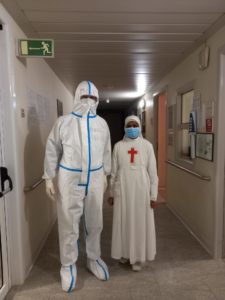


A father in the wards, on his own, to provide support to the patients. This is the story of Fr. Davide Negrini who during the darkest days of the first stage of the pandemic took responsibility for providing spiritual support to patients and health-care personnel in the Santa Chiara Hospital of Trento (Italy).
Christmas 2020: Jesus the Hope that does not disappoint
In December 2019, we saw the problem of Corona virus far away from us, and we hoped that it would remain confined to Wuhan in China, because it was quickly defeated. We were still feeling reassured by institutional statements that the virus could never cross our borders, but in February 2020, we were surprised to learn that the virus had taken up residence in our home.
In a short time, the bomb that exploded in Codogno (North Italy) knocked down all our certainties, and suddenly, our beautiful country was found hit hard by this virus. City after city, country after country, COVID-19 spread throughout the world, and even today the whole planet continues to grapple with this very insidious pandemic.
We all found ourselves unprepared. Fear has rightly taken over our lives; anger for the numerous innocent victims is gripping us; the Decrees of the Government (DPCM), lockdowns, and so on keep us in a climate of uncertainty and precariousness. The socio-economic crisis triggered by the health emergency has broken down the very few existing and resistant banks of our welfare and quiet life. Our existing scientific certainties have proved fragile in the face of questions about the origins of this virus and about the therapies to defeat it. Everything is a continuum of not very comforting situations. And everyone wonders: When will we see the light at the end of this long tunnel?
In fact, despite the avalanche of slogans of mobilization and of encouragement, despite our combativeness, the Pandemic has done nothing but invade more and more of our existence. Easter, Easter Monday, Liberation Day, Labour Day, Republic Day, Assumption Day, All Saints’ Day, Immaculate Conception… important feast days that mark our liturgical and social journey, took place this year under the dictatorship of the Pandemic and its rigid rules. Even Christmas, our beautiful and special Feast of the Dies natalis of Jesus, a feast of joy, of hope, of conviviality, of families, of children, of gifts, even the feast of St. Stephen, New Year’s Day, etc. will not be an exception; indeed, the rules of social distancing are and will be the harshest ever adopted. Nothing lacks to make the year 2020 terribly unforgettable.
Quei funerali non celebrati
Da Missione Salute N.5/2020 pp.14-15
By Fr. Augusto Chendi
The deaths in loneliness and the coffins with no one to watch over them, which the pandemic has forced us to witness, have eroded the most characteristic trait of our being human: pietas for the dead. All civilizations are based on pietas, and being deprived of it demands, as individuals and as a community, a serious reflection to decide how the world of tomorrow will be.
The baggage of torment and pain that have accompanied and still distinguishes the Covid-19 pandemic found an emblematic expression in the loneliness, in which hospitalization prevented even family members from saying final goodbye to their loved ones. This pandemic, with its necessary measures to contain contagions, has made that loneliness – deprived of the comfort of a farewell caress – perhaps even more bitter than death.
The other lost goodbye was for those left behind. Not being able to be close to the family member until the very last, not being able to honour him or her for the last time, not being able to say goodbye shocked us. We have thus come to know agony and death in loneliness, even to get used to it. The dead have become mere numbers in the television bulletin every night. Death has become serial, a matter of cold statistics, without names, faces and stories, anxiously scrutinized while we waited to return to normality. READ MORE
NEW THINGS
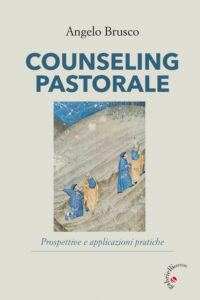


How should we live? How should we live a happier, more sensible and freer life? These and similar questions often arise in people, above all during moments of difficulty or crisis as regards the various fields of existence – from the physical to the emotional, from the social to the spiritual – which lead them to ask for help. Pastoral counselling is one of the forms of response to these requests for help that emerge in the family, at work, in health-care educational institutions, and in the Church community.



The life of Nicola d’Onofrio was short but intense. He was a Camillian religious who was killed by an incurable illness at the age of 21 and later proclaimed Venerable by Pope Francis in 2018. His parents were country people who were sincerely Christian and he was born in 1943 in Abruzzi, which at that time was in a state of upheaval because of the war. He very quickly discovered his call to the priesthood, to religious life and to service to the sick in the Order of St. Camillus, who, indeed, came from his own area.
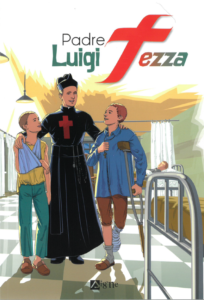


FCL – The Covid situation in Peru
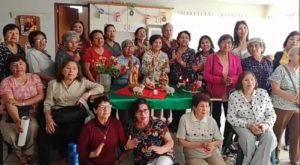


FAMIGLIA CAMILLIANA LAICA – AUSTRALIA



THE PROVINCE OF THAILAND
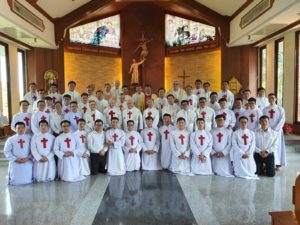


THE DELEGATION IN KENYA – KARUNGU
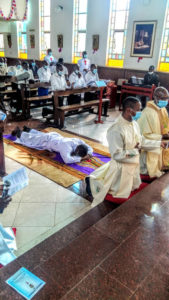


His religious profession, which took place at the St. Camillus Seminary at Nairobi, was received by the Delegate Superior, Fr. Dominic Mwanzia.
Our confrere Kiarie – as he is widely called – provides pastoral service at the hospital chaplaincy of the St. Mary Mission Hospital of Elementaita, in the diocese of Nakuru.
With the edition of this year of the Newsletter ‘Milome’ we bring you the principal activities and projects that have been set in motion and engaged in at the St. Camillus Mission Hospital of Karungu. In carrying out the noble vocation of our Founder St. Camillus de Lellis we are always called to accompany those who are vulnerable during moments of darkness and in all the circumstances of human suffering.
THE PROVINCE OF BRAZIL
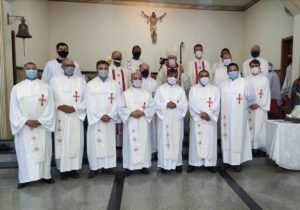


The celebration took place on Saturday 12 December 2020 in the Camillian parish of the ‘Santíssimo Sacramento da Eucaristia’ in Cachoeiro de Itapemirim (ES).
THE DELEGATION IN TAIWAN
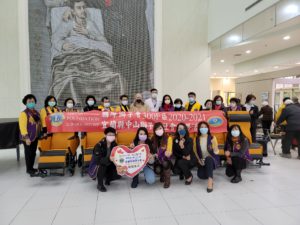


In 28 December the Archbishop of Taipei visited the Camillian parish of Nan Ao and celebrated a Holy Mass in the geriatric department of the hospital. During the service three patients were baptised.
Since 14 November Msgr. John Lee Juo-wang, aged 54, has been the new Bishop of Tainan, one of the seven dioceses of Taiwan, in the South-East of the island. Fr. Didone and Fr. Matteo Kao took part in the 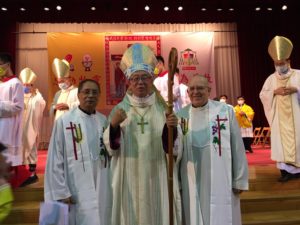


Seven special wheelchairs have been given to the St. Camillus Hospital of Taiwan by the Ilan Lion association.
As takes place every year, we wanted to thank all those who work with us by organising a series of events.
The end-of-year meals, following Chinese custom, have begun, provided by various Camillian organisations, to thank our employees for the contribution they made last year.
At Kaoshiung an event took place to collect funds for the new hospital of Makung. Father Didonè took part as a representative of the Order.



L’«Anno di San Giuseppe» indetto da Papa Francesco ha innescato una ricerca di documenti che dessero argomentazioni per una degna Celebrazione e studio, stando a quanto Papa Francesco sollecita nella Lettera Apostolica “Patris Corde“: «Lo scopo di questa Lettera Apostolica è quello di accrescere l’amore verso questo grande Santo, per essere spinti a implorare la sua
intercessione e per imitare le sue virtù e il suo slancio. Infatti, la specifica missione dei Santi è non solo quella di concedere miracoli e grazie, ma di intercedere per noi davanti a Dio, come fecero Abramo e Mosè, come fa Gesù, «unico mediatore» (1 Tm 2,5), che presso Dio Padre è il nostro «avvocato» (1 Gv 2,1), «sempre vivo per intercedere in [nostro] favore» (Eb 7,25; cfr Rm 8,34). Gesù ha detto: «Imparate da me, che sono mite e umile di cuore» (Mt 11,29), ed essi a loro volta sono esempi di vita da imitare. San Paolo ha esplicitamente esortato: «Diventate miei imitatori!» (1 Cor 4,16). San Giuseppe lo dice attraverso il suo eloquente silenzio.»
Radio Vaticana – San Giuseppe, riscoprire il suo ruolo di ‘patrono della Buona morte’ 08/01/2021
Intervista rilasciata da p. Gianfranco Lunardon sulla figura di San Giuseppe e il suo ruolo di ‘patrono della Buona morte’.
DIOCESI DI ROMA – PASTORALE DELLA SALUTE
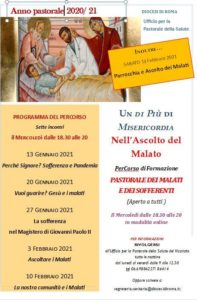


RETTORIA DELLA MADDALENA
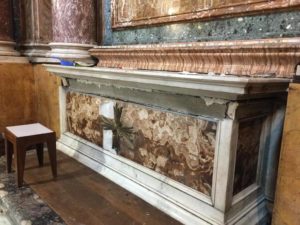


DECEASED RELIGIOUS
«Ecco, ora svaniscono. I volti e i luoghi, con quella parte di noi che, come poteva, li amava, per rinnovarsi, trasfigurati, in un’altra trama!» (T.S. Eliot)



His death took place on 7 January 2021 at the St. Camillus nursing home of Cremona.



PREGHIERA A SAN GIUSEPPE
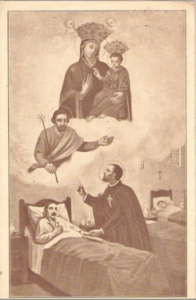


ON THE 150th ANNIVERSARY OF THE PROCLAMATION OF SAINT JOSEPH AS PATRON OF THE UNIVERSAL CHURCH
We need only ask Saint Joseph for the grace of graces: our conversion.
Let us now make our prayer to him:
Hail, Guardian of the Redeemer,
Spouse of the Blessed Virgin Mary.
To you God entrusted his only Son;
in you Mary placed her trust;
with you Christ became man.
Blessed Joseph, to us too,
show yourself a father
and guide us in the path of life.
Obtain for us grace, mercy and courage,
and defend us from every evil. Amen.
Given in Rome, at Saint John Lateran, on 8 December, Solemnity of the Immaculate Conception of the Blessed Virgin Mary, in the year 2020, the eighth of my Pontificate.


